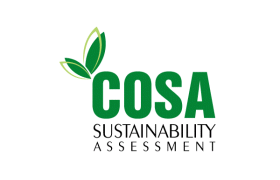The newly published COSA Measuring Sustainability Report illuminates the salient findings from nearly 18,000 surveys between 2009 to 2013 in Africa, Asia and Latin America for coffee and cocoa – two important commodities that are bellwethers for sustainability trends in other crops.
The COSA Measuring Sustainability Report is a result of COSA’s seven year journey to evolve a common set of practical indicators and metrics in collaboration with many organizations and experts. It presents a compelling combination of surprising findings, unexpected results, and lessons learned.
The Committee on Sustainability Assessment (COSA)
The Committee on Sustainability Assessment (COSA™) is a global consortium of institutions fostering effective ways to measure and understand sustainability in the agri-food sector. COSA has developed a transparent meta-tool (common framework and indicators) to understand the costs & benefits of sustainability in a globally consistent and scientific manner.
In 2012, COSA became an independent non-profit organization, registered with 501c3 status in the United States.
COSA receives grant funding from foundations and institutions whose mission is to invest in development and sustainability. COSA is also hired by organizations with financial, environmental, and/or social reasons to measure the sustainability of their efforts.
What are COSA’s Core Activities?
- Development of a globally consistent and scientifically rigorous methodology
- Collection of data from commodity-producing farms around the world
- Development of decision-making tool for use by farmer groups
- Building institutional capacity with partners to collect high-quality data on sustainability in their region
- Creation of a database for global dissemination of this information with the U.N.’s International Trade Centre
- Facilitation of policy dialogue and successful investment in sustainability based on findings
COSA has several distinctive characteristics:
Local Research Partners
COSA has a history of close work with partner institutions located in the countries in which we work. These partnerships extend COSA’s impact and allow better understanding of local contexts.
Methods and Indicators
The methods were developed by a broad group of stakeholders that range from producer groups and NGOs to international agencies and private firms. They were based on the Bellagio and Rio principles focusing on economic, social, and environmental measures. COSA’s indicators align with and have been benchmarked to dozens of key International and Normative References.
Flexible Solutions
COSA offers flexible solutions for better understanding and managing sustainability ranging from performance monitoring to systems integration to complete impact assessment.
State of the Art Science
From the use of the latest social science research on survey and sampling methodology to the use of logic-enabled software on mobile computers to conduct field research, COSA relies on cutting edge sustainability science.
Where does COSA operate?
COSA works in developing countries where sustainability issues in agriculture currently have the greatest impact. After the first small-scale piloting work in 5 countries (2007-2008), it expanded to projects in twelve countries .
Together with leading partner institutions, COSA is committed to advancing the local and global understanding of sustainability.
Its experience began with the world’s most economically important agricultural commodity. Coffee is grown in nearly 80 developing countries and is a primary export for several of them; it provides a livelihood for more than 25 million families, nearly all of whom are smallholders.
COSA has expanded to cacao and recently, food crops. It intends to soon address a number of other crops, acknowledging that will take several years and new, interested partners in order to expand work into cotton, palm oil, tea, biofuel crops, soy, fruit and other horticulture crops.
The COSA Measuring Sustainability Report can be downloaded at this link.


















